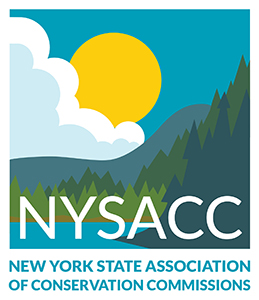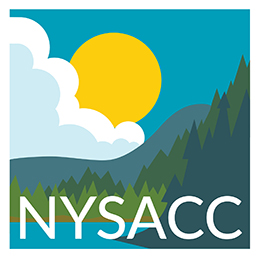| Question: Our CAC is going to be talking to our village board about leaf blower restrictions. We are putting together slides to show the health and ecological issues. Does anyone have slides or material they could share with us? |
NYSACC Response:
Check out these contacts:
- “Leave Leaves Alone” http://www.leaveleavesalone.org/ Leave Leaves Alone! was developed by a group of Bedford, NY, residents in 2011, most of whom were Cornell Cooperative Extension Master Gardeners, concerned about the environmental pollution and destruction of soil properties caused by the practice of leaf blowing. Our message goes far further than our small town and our mission is to educate landscapers and homeowners on the value of leaves and leaf mulch; to remind them that nature is there to do most of the work for us, and that fall leaves are a great natural resource that should be valued and not regarded as trash.
- “Huntington C.A.L.M” https://huntingtoncalm.org/ Huntington CALM (Clean Alternative Landscaping Methods) provides education and outreach on the health and environmental impacts associated with highly polluting, noisy landscape equipment in their Long Island town. Our mission is to move the commercial landscape industry to zero emission, quiet, sustainable practices, starting with the elimination of the highly polluting two-stroke engine gas leaf blower. We offer positive solutions that protect the health of families, workers, and our environment.
- Do you live in Nassau County? The Hon. Arnold Drucker (legislator, 16th district) is planning to introduce a bill to prohibit the use of gas-powered leaf blowers.
Please use the convenient form below to contact Legislator Drucker and let him know that you support this legislation. You may also contact his office directly at his website or call 516-571-6216.
- Senator John Liu (11th Senate District) has introduced legislation to the New York state senate, that would prohibit the use of gas-powered leaf blowers from May 1 to September 30. You may also contact his office directly at his website
- Spreadsheet of Westchester County towns, villages, and cities with leaf blower legislation
- “Love ‘em and Leave Them”, an initiative of Westchester County http://www.leleny.org/
- The Dobbs Ferry Abundant Efficiency Committee (nina@abundantefficiency.com) said that when they had their leaf blower restrictions approved, they received letters from local pediatricians, including the official pediatrician of their school district, addressing health impact for children related to leaf blowers.
They state that this was very helpful in having the seasonal restrictions adopted.
- “Healthy Yards” provides a very comprehensive archive of information pertaining to leaf blowers that includes an excellent power point presentation by the City of Rye Sustainability Committee. In addition, Healthy Yards promotes dialogue with residents’ landscapers:
|

The majority of the landscapers are engine operators and have little knowledge of gardening. They do hard and exhausting work, often for little money. The logistics of operating a landscaping business can be complicated and the intense competition is forcing many companies to speed up, which usually involves more machinery.
It is difficult for companies to customize their service. Doing the same thing with the same tools from property to property is most efficient. Regretfully this ‘efficient’ practice, that has become the standard, is doing serious damage to our landscapes.
While they deserve our respect, there is no need to accept landscaping services that are harmful to our health or to the health of our landscape. In the Dig In webinar tomorrow, organized with Bedford2020, we will talk with professional landscaper Jeff Cordulack, from Organic Ways & Means, about how to recognize harmful practices and how to discuss these with your landscaper. |

| Here is a list of landscaping practices that can be harmful for several reasons. Be aware that your landscaper might offer them with good intentions. |
- Refuses to mulch mow grass and leaves
- Is unaware of the existence of mulching blades
- Blows leaves from planting beds, leaving the soil bare
- Removes grass clippings, because it is ‘better’ for the turf
- Cuts the grass below 3 inches
- Claims pesticide or fertilizer applications are the standard
- Says that their pesticides are safe
- Tells you that their products are natural or organic and therefore safe
- Uses synthetic liners as weed barrier
- Plants annuals in beds, rather than perennials
- Doesn’t recognize plants or know plant names
- Doesn’t recognize invasive plant species
- Suggests a layer of mulch is good for all plants
- Suggests fertilizers are good for all plants
- Uses a fertilizer with phosphorus
- Uses chemical fertilizers close to lakes or streams
- Creates a volcano of wood mulch around a tree base
- Claims that battery operated blowers aren’t strong enough
- Mows after the rain when the soil and grass is still wet
- Uses a disproportionate large mower for a small lawn
- Blows or mows along edges of waterways
- Blows debris across the street
- Doesn’t wear hearing protection while operating a blower
- Doesn’t have a license
- Has different workers every time they visit
- Gives you the feeling, when you talk to them, they are not really listening or taking your requests seriously
|
 |
| Remember: You are PAYING for your landscaping service. So, don’t be afraid to speak up! |
|
Your landscaper might claim that ‘better’ services require a higher price. If you’re asking for the use of a rake instead of a leaf blower, that is true. But there are ways to make it work for you both. Ask the worker who normally operates the leaf blower to do some hand weeding while the others mow and edge. Ask your landscaper to mow only once every two weeks in summer (when the grass isn’t growing fast) to compensate for longer visits or more frequent visits in fall — if your property has a lot of trees. Or, instead of mowing every week, they can still come but weed and remove invasives, build a compost pile, remove dead wood from shrubs, etc.
A good landscaping business is willing to listen.
|








You must be logged in to post a comment.